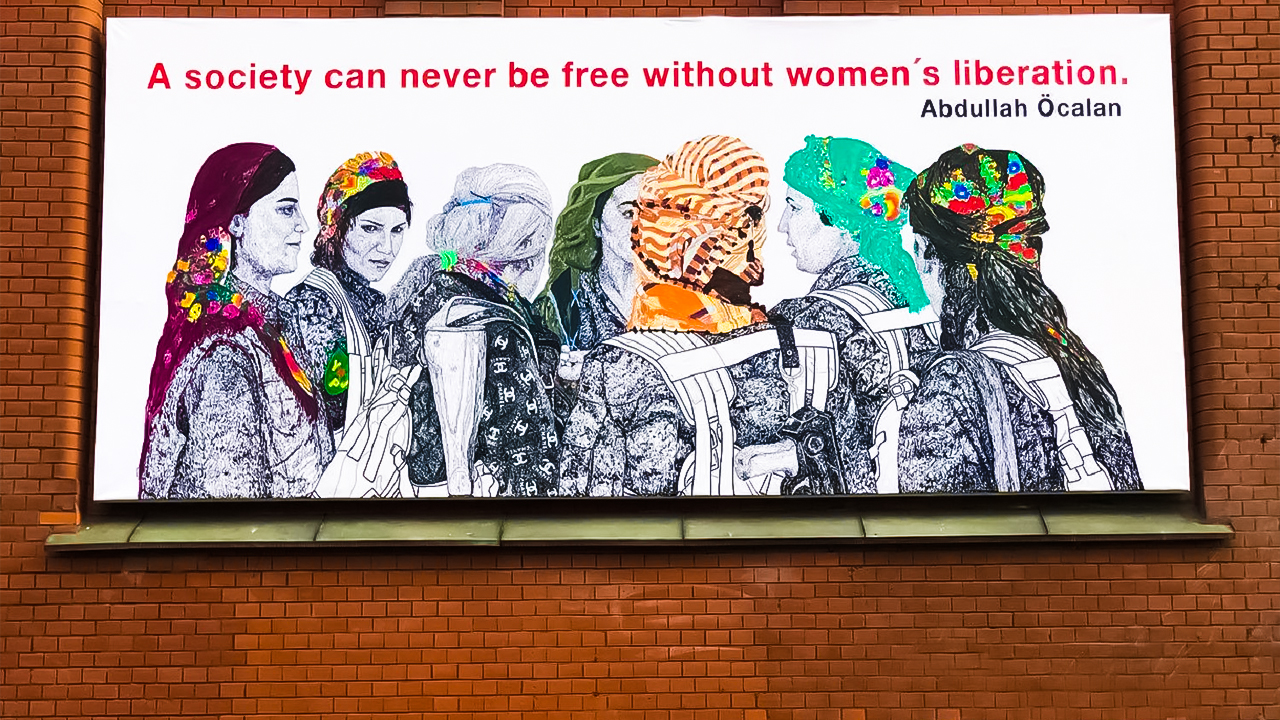Debates on co-existence
“All kinds of political, social, economic, cultural as well as sexual, emotional and intellectual affairs between men and women can be dealt with by the concept of ‘co-existence’ formulated by leader Apo [Abdullah Öcalan]. The theory of ‘free coexistence,’ a concept which lies in the concept of a ‘free and shared life,’ transforms the relations of men and women in all spheres of life on a libertarian and egalitarian basis,” Zozan Sima writes for Yeni Özgür Politika.
The model based on dominance, which is reflected in all spheres of life of the man-woman relationship, takes family, marriage, sexuality and love affairs as its model.
Although family, sexuality, love and marriage seem to be directly related, intertwined and mutually inclusive, the sociological-historical analysis of both can offer us a wider horizon. Maybe these do not contain each other as much as we believe.
The family is an institute made possible by marriage, and sexuality has a character that is considered legitimate by society only when it exists in marriage. At the same time, marriage has been attached with a characteristic that ensures the security of the economically disadvantaged woman with the man, who almost purchases the service provided by the woman and continues his bloodline.
Historically, the family carries the bonds of solidarity and love since it represents the first commune. However, with its patriarchal formation, it turns into the nucleus of the state. Because of this contradictory structure, the family has been under constant criticism and also a shelter to surrender. (…)
This is not a problem of whether two people love each other in a good, beautiful way, with deep passion and feelings. Because co-existence has not been shaped around the relationship of the female and male, but as the relationship of femininity and masculinity shaped by society. The dominance of men over women has revealed a hegemonic co-existence model, a system in which love lacks all the means to realise itself. (…)
The construction of co-existence on these grounds affects not only the emotional and sexual life of two people but also the whole society, the whole ecological life of societies in regard to its effects on population, poverty and the spread of the culture of violence. (…)
“Without the Bermuda Triangle of woman-family-man well marked on the map, it can easily sink any social solution ship that passes nearby.”
This is how leader Apo summarises this truth.
As corruption and immoderacy increases in this realm, where all masks fall down, where personality and lifestyle are literally revealed in their most naked form, the numbers of things that take on the cloak of secrecy and privacy also increases.
With the beautiful expression of an author, “when we become impersonal, we build higher fences around us where no one can see us.”
Perhaps it is the secret services of the states that see this fact most clearly.
For this reason, tape wars, audio recordings, tapped phones, stolen personal information are most often about relationships in the context of sexuality, family, marriage and love affairs. These have become the most effective ‘special combat and dishonouring tools’ of the era.
Women’s liberation movements are engaged in an intense struggle to prevent the damage inflicted on people, society, women, children, and nature by the hegemonic framing of coexistence. The only part that is missing in this struggle is the embodiment of free co-existence.
What we mean by “embodiment” is not about finding ideal love, an ideal woman and an ideal man: we do not mean an ideal model of marriage and family. Embodiment is about getting rid of the traps of hegemonic relationships of men and women in search of freedom and building the methods, tools and institutions that need to be developed to build relationships based on freedom.
It is about contemplating libertarian relations apart from hegemonic relations, and reflecting this in art and literature.
Leader Apo defined this in placing art, economy, politics and religion in the service of co-existence.
What can the art of free co-existence be? Is it not possible to write a theatre piece, a screenplay or a novel on free co-existence? How can the struggle for the democratisation of the family be undertaken? Is it not possible to ascribe philosophical meanings to love?
Every woman and man influenced by the Kurdish freedom movement must question how much their perspective of family and relationships have changed with regard to the concept of free co-existence.
First published in English on Medya News


